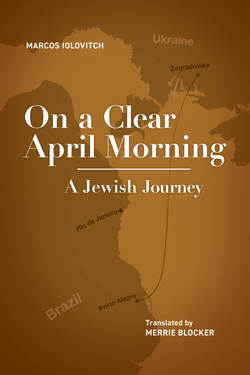Читать книгу On a Clear April Morning - Marcos Iolovitch - Страница 17
На сайте Литреса книга снята с продажи.
ОглавлениеChapter 5
I don’t know how, nor from where, Papa managed to get the money for the trip. I only know that on a cold winter night, we arrived in Porto Alegre, the state’s capital and largest city.
After embracing their friends and relatives, the other passengers, who had come on the same train, were leaving the station area. Only our family remained on the deserted platform. We didn’t know anyone and no one knew us.
A railway company employee came over to tell us something.
“Me no understand Brazilian,” stammered Papa, completing his thought with gestures.
The official, with a discrete smile, explained to us with more gestures that it was time to shut the station’s doors.
We hastily grabbed our bags and exited the station, stopping, undecided, on the sidewalk, not knowing which way to go.
Right away runners approached us offering various services. Papa said no with a shake of his head, looking stunned at the very busy rua Voluntarios da Patria.
Streetcars passed full of people. Automobiles rapidly sped by each other, honking impatiently. Boys ran by hawking the evening newspapers. Men and women, some in pairs, walked hurriedly on the sidewalk with a somber air, preoccupied, swelling the immense human wave that came and went in an uneven and accelerated rhythm.
Forlorn and abandoned, we were saved by a Jewish cart man, who after a short conversation took us to his house, where he generously offered us his modest hospitality.
This merciful man still lives in Porto Alegre. He is, however, almost blind. Because he saw the sufferings of others, God, who is infinitely good, almost took away his sight. . . .
Without money and without a profession, with a large family and in wholly foreign surroundings, only one way to enter this new life remained for Papa—the same way he exited the last, through the gateway of commerce.
He chose the profession of fishmonger, the only one he could carry out within the conditions in which he found himself. It didn’t demand much capital or knowledge of the language.
He bought two baskets and, tying them together with a long strap, went to the market, filled them with fish and returned shouting:
“Fis . . . fis . . . baaases.”
Mama, who since early in the day had been impatiently waiting for him, recognized his voice and ran to the window. When she saw him in the distance loaded down with baskets advertising his merchandise in loud cries, she left the window exasperated.
Shortly afterward Papa arrived. He entered happily. He pulled the strap off his neck and put his load down on the floor.
“Well,” he said, rubbing his hands and straightening up his body. “Today is won. Tomorrow, God will have to help us again.”
Seeing his wife sad and imagining her inner displeasure he justified his actions.
“We are in the New World, woman. And here any occupation is acceptable. Honest work is not dishonorable.”
Pulling out a fish, he changed the subject,
“Take this and prepare a good lunch. It’s getting late, and I still have some rounds to make to sell the rest.”
Grabbing the fish without enthusiasm, Mama muttered sighing:
“How nice, what a nice exchange you made. You left the store in Russia to become a fishmonger in Brazil.”
Papa didn’t respond. He bent down, put the strap around his neck, lifted up the baskets and, casting Mama a reproachful look, he left.
His wife’s plaint had hurt him, deeply. He wasn’t to blame for the situation they had landed in. He had made the change with the best of intentions. Choosing agriculture, he had thought to give his sons a good future. He couldn’t live by exploiting others. His conscience rebelled. He wanted a productive life.
He brushed away the thoughts that were saddening him with his breadwinner’s litany,
“Fis . . . fis . . . . ”
And every day, at almost the same time, he filled the streets of that neighborhood with the same refrain:
“Fis . . . fis . . . . ”
At the end of the first month of work, he rented a house on rua Castro Alves where much of the city’s life played out. We moved at night. I think it was to hide our dire poverty.
As fish was only sold in the mornings, Papa used the afternoons to sell fruit. And as soon as he had enough money for two more baskets, Solon and Luiz began to help him selling oranges and bananas.
After a few weeks, Solon got a job selling sweets for a German widow. At night he would wash the dishes for her.
